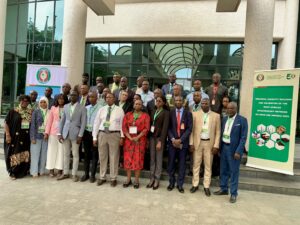The Economic Community of West African States (ECOWAS) has strengthened its efforts to tackle the menace of illicit drug trafficking, consumption, and organised crime by validating the 2024 Data of West African Epidemiology Network on Drug Use (WENDU).
12 ECOWAS Member States and Mauritania announced the validation at the end of a three-day WENDU Regional Workshop on Capacity Building and Data Validation on Saturday in Abuja.
ECOWAS also pledged to continue supporting member states through capacity building, legal reform support, and the deployment of the new regional digital WENDU platform.
The News Agency of Nigeria (NAN) reports that the workshop was organised by ECOWAS to strengthen the region’s collective response to drug trafficking, consumption, and related organised crime.
The countries that attended the workshop and validated the document are: Benin, Cabo Verde, Côte d’Ivoire, The Gambia, Ghana, Guinea-Bissau, Guinea, Liberia, Nigeria, Senegal, Sierra Leone, Togo, and Mauritania.
WENDU was inaugurated nine years ago by ECOWAS to help governments gather, analyse, and share data on drug trends from seizures and arrests to treatment statistics to guide evidence-based public policies.
The participants noted that West Africa was facing an escalating threat from illicit drug trafficking and use, with serious impacts on public health, socio-economic development, and regional security, hence the need to curb it.
NAN reports that the workshop’s document indicates that the validated 2024 data will feed into an upcoming WENDU Regional Report to support future policymaking at both national and regional levels.
The document also indicates that the workshop produced many positive outcomes, the highpoint of which was that the 2024 WENDU Member States data were presented and validated by national focal points.
“Delegates were trained on a new digital data collection platform, designed to modernise WENDU reporting.
“Participants reaffirmed the need for balanced, multisectoral responses to drug-related challenges, grounded in public health and human rights.
“Emerging concerns include the growing circulation of synthetic drugs, such as “Kush”, reported in multiple countries,” the report said.
The workshop also produced a set of strategic recommendations to advance the regional response efforts.
These are strengthening national capacities for prevention, treatment, and data collection, expanding data sources, and improving data quality and harmonisation.
Other recommendations included fostering multisectoral collaboration across health, justice, security, civil society, and integrating gender perspectives into drug policies and reporting.
The recommendations also included updating legal frameworks to address new substances and human rights issues, and developing targeted prevention campaigns for youth and communities.
Also recommended were the strengthening of early warning systems for emerging synthetic drugs, and expanding treatment centres and mental health services.
The participants also recommended enhancing cross-border cooperation to disrupt trafficking networks, as well as finalising and operationalising the regional WENDU digital platform.
Earlier at the opening ceremony, Prof. Fatou Sarr, ECOWAS Commissioner for Human Development and Social Affairs, reaffirmed the Commission’s commitment to strengthening WENDU as a strategic instrument for guiding public policy.
Mrs Henrietta Bakura-Onyeneke, Director, Narcotics and Drug Abuse, Nigeria’s Ministry of Health, stressed that robust data collection was not just a technical necessity but a regional imperative to safeguard public health and security.



[…] Wild Africa and the World Parrot Trust have called for stronger protection of parrots in Nigeria, as the world celebrates the World Parrot Day. This is contained in a statement jointly issued by […]
[…] are partnering with chairmen of Local Government Areas (LGAs) and traditional rulers to to show those affected by this relocation directive where they should go […]